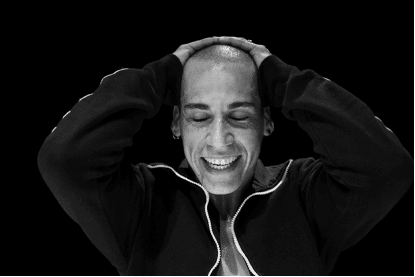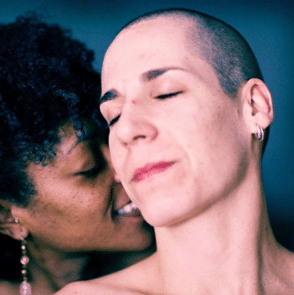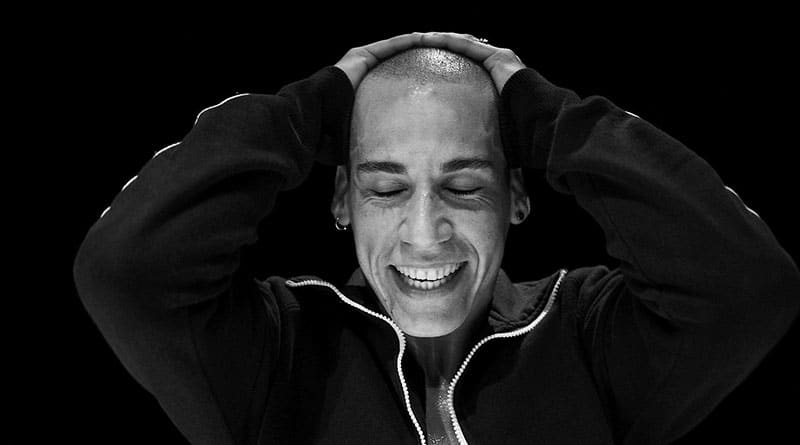Daniel Mariblanca: A transgender voice in dance
I first met Daniel in dance school. He was an alluring woman. I remember being captivated by her at first sight. That pure beauty, that reserved and quiet being, that extreme commitment to dance. I admired him from a distance. Now, fifteen years later, we meet to talk gender, identity and freedom.

‘I have freed myself from the categories of woman and lesbian not to be a heterosexual man, but to open new spaces’
What does it mean to you to be ‘Trans’?
I am 36 years old and I have lived 34 of those years as a woman who identified as a lesbian. Those are very solid pillars in me which I have defended with strong emphasis. Then five years ago, I started to get in contact with a lot of Trans people in Barcelona who inspired me deeply. That was when I started questioning the pillars of my live. In some way it was like getting to understand the relation between pieces that weren’t yet connected. We could maybe say that being a woman and being a lesbian was a massive cover up under which I felt encouraged and secure. By then being Trans was an inaccessible idea to me, something difficult to understand. That is why, when I first met the Trans collective and I realised how many different ways of being Trans exist, I could find my place within it. So then, going back to the question, to me being Trans means to give myself the opportunity of being who I am at every moment; to choose my name, to choose the pronoun when referring to me, to choose my sexuality while seeing it in a free-flowing way. To choose, that is what it really means to me.
How would you define femininity and masculinity?
I think those terms are fictionally constructed roles. I understand that femininity and masculinity are gender expressions associated to a binary system, which integrates ‘cisgender’ men and women who are usually heterosexual. Considering just the hegemony of those concepts, ‘femininity’ would belong to a ‘cisgender’ heterosexual woman and ‘masculinity’ would portray the ‘cisgender’ heterosexual male.
Sorry I’m not familiar with the term ‘cisgender’…what does it stand for?
When a baby is born it goes through sex assignment which associates the baby with a gender. Later on in live, that person identifies themselves with a gender category. In the binary system, a person is considered ‘cisgender’ when the initial assignation and the post self identification match. It is important to know and understand terms like ‘cisgender’ because its helps to legitimize the concept of being Trans. Acknowledging ‘cisgender’ as one more category helps shift the criteria of what is or not normal, giving each category a sense of one more in between other ways of self perception.
Has being a Trans person opened up gender possibilities or imposed gender limitations?
When I’m in a secure zone, surrounded by people that have certain knowledge and a way of living which integrates enormous diversity, definitions become less and less important, definitions are not needed.
However, when I find myself in a segregated environment, with male and female changing rooms, male and female toilets, male and female activities… such binary environments, where there is just one or the other but no in-betweens, no free-flowing parts, then I can sometimes find the limitations of occupying a masculine side now. I have freed myself from the categories of woman and lesbian not to be a heterosexual man, but to be able to trespass all those constrained categories and open new spaces. Spaces where it is not that important to belong to one or the other, but where one can constantly flow, change, get it wrong, go back and go forward.
The dance world is known for embracing and integrating the LGBTQ community. But gender stereotypes are still dominant within it. From stage roles to audition call-outs and leadership, gender sets strong boundaries in the industry.
Gender roles are based on heterosexual stereotypes that are represented on a pyramid scale of powers. In our world gender is a filter that can be found everywhere. From audition notices to the products in a shop or the professions which a girl or a boy are encouraged to undertake gender is constantly present. Dance is not an exception and therefore dance cannot escape it. I have been in situations where it was compulsory to wear specific underwear, or where I had to move in a specific way according to gender. Those behaviours oppress everyone at a lower or higher level; you don’t need to be Trans to feel restricted by those impositions. Gender is a limitation and it has presence in all the spaces that humans occupy.
In order to transform it is necessary to make the issue visible first, and then suggest new actions. It is very complex because it involves many concepts, like gender expression, gender identity, sexual orientation, anatomy… therefore it is a slow process of unravelling to get to the bottom of understanding where this oppression comes from.
How can performance help opening up the debate on Gender?

The way I like to do it is creating dialogue. I don’t believe in making statements but in making people think and creating curiosity.
It is also important to create dialogue in different levels; speak to those who are already interested and educated in gender diversity and also to those who have never question their sexuality. Being inclusive at all levels and being creative. It is not that much about finding answers but about discovering spaces.
Has your physical change affected you career?
I don’t feel like having male privilege in the sense of having more work opportunities, but obviously that exists. I ‘came out of the closet’ -to say it simply- when my contract with Carte Blanche was due for renewal and I certainly wanted to work somewhere where my persona was respected. After coming out to them my contract was renewed for three more years, and I think it would have been anyway because the baseline is not my gender identity but my quality as an artist. I do not think being Trans has opened more opportunities to me, but I do believe that the happier you are the more chances you generate for yourself. I currently feel urgency for creating, exploring, expanding, deepening… and I don’t think that is linked to the male privilege but to the feeling of well-being.
Daniel has danced for Angels Margarit, Sol Picó, Lisi Estaras, Jelena Kostic, Ugo Dehaes, Arco Renz, Konzert Theater Bern, Pink Mama and Fabian Chiquet amongst many others. He has spent the last years collaborating with others artists and is currently combining his job at Carte Blanche with his personal project 71BODIES 1DANCE.
We first met in Eulàlia Blasi, a dedicated small school in the heart of Barcelona. He was then accepted in the conservatoire, l’Institut del Teatre, where his talent got him straight into fifth grade graduating after two years. Now, fifteen years later, I meet the real him.
- Daniel Mariblanca: A transgender voice in dance - July 4, 2019
- HKICAROS & Hong Kong International Choreography Festival–Where east and west meet. A space to question, discuss, explore and develop choreography; creating its present to envision its future. - July 3, 2019
- Plain speaking;a conversation with Choreographer Jamaal Burkmar - July 2, 2019

